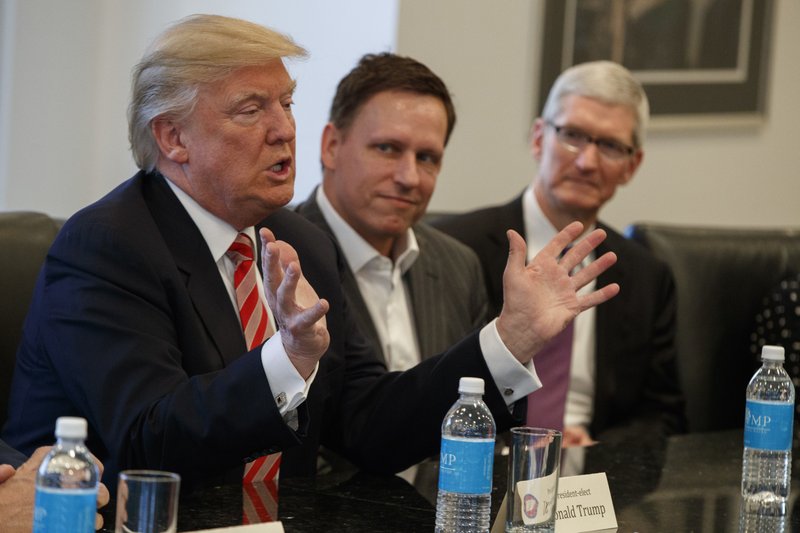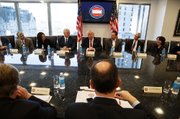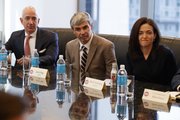NEW YORK -- President-elect Donald Trump, who faced fierce opposition from some Silicon Valley leaders during the election campaign, strove to assure the tech industry on Wednesday that his administration is "here to help you folks do well."
RELATED ARTICLES
http://www.arkansas…">Conservatives hope U.S. to give up land http://www.arkansas…">Boozman 1 of 2 inviting Trump to prayer event
Trump convened a meeting at Trump Tower for nearly a dozen tech leaders, whose industry largely supported Democratic nominee Hillary Clinton. Many in the industry are worried that Trump will stifle innovation, curb the hiring of computer-savvy immigrants and infringe on consumers' digital privacy.
He immediately tried to allay those fears.
"We want you to keep going with the incredible innovation. Anything we can do to help this go on, we will be there for you," Trump said. "You'll call my people, you'll call me. We have no formal chain of command around here."
[TRUMP: Timeline of president-elect’s career + list of appointments so far]
The CEOs who filled the table in Trump's 25th-floor conference room, included Apple's Tim Cook, Alphabet's Larry Page, Google's Eric Schmidt, Microsoft's Satya Nadella, Amazon's Jeff Bezos, Tesla's Elon Musk, IBM's Ginni Rometty, Oracle's Safra Catz and Cisco Systems' Chuck Robbins. Facebook's chief operating officer, Sheryl Sandberg, attended instead of its CEO, Mark Zuckerberg, who is one of many tech executives who have expressed misgivings about Trump's pledge to deport millions of illegal aliens.
The president-elect greeted the executives effusively after they were seated around a long rectangular conference table.
"This is a truly amazing group of people," Trump said. "I won't tell you the hundreds of calls we've had asking to come to this meeting." Everyone laughed.
"I'm here to help you folks do well," Trump said, adding somewhat cryptically: "And you're doing well right now, and I'm very honored by the bounce. They're all talking about the bounce. So right now everybody in this room has to like me -- at least a little bit -- but we're going to try and have that bounce continue."
The meeting remained amiable and the group, which agreed to meet quarterly, also had preliminary discussions about immigration and how to stay competitive with China, though no firm commitments were made, according to a person briefed on the meeting but not authorized to discuss it publicly.
Trump was joined by several members of his senior staff and his three eldest children, who are expected to help run his business once he takes office.
Reporters were allowed to witness only the first moments of the meeting, and most of the attendees departed without comment. But Bezos, who is also owner of The Washington Post, which has been a frequent target of Trump complaints about campaign coverage, said he found the meeting to be "very productive" and said he "shared the view that the administration should make innovation one of its key pillars."
No industry was more open in its contempt for Trump during the campaign. In an open letter published in July, more than 140 technology executives, entrepreneurs and venture capitalists skewered him as a "disaster for innovation."
And Trump's denigration of Mexicans, his pledge to deport millions of illegal aliens and his crude remarks about women were widely viewed as racially insensitive, authoritarian and sexist by an industry that prides itself on its tolerance.
Trump, in turn, sometimes lashed out at the industry and its leaders, and -- despite his reassurances Wednesday -- questions remain about how he'll govern.
He has lambasted Bezos for the Post's campaign coverage and has suggested that Amazon could face antitrust scrutiny after his election. Trump also rebuked Cook for fighting a government order requiring Apple to unlock an encrypted iPhone used by a shooter in last year's terrorist attack in San Bernardino, Calif.
And Trump's repeated negative comments about immigrants raised fears that he might dismantle programs that have enabled tech companies to hire tens of thousands of foreign workers with the skills to write computer programs, design Web pages and build mobile apps.
The industry also is worried that Trump might try to undermine "net neutrality," a regulation requiring Internet service providers to offer equal access to all online services. Trump's harsh characterization of the media as dishonest and unfair has raised other fears that he might try to restrict free speech online.
Some in Silicon Valley think that the industry's best move would be to keep its distance until Trump changes his tone. Former Google executive Chris Sacca, now a tech investor, argues that industry leaders should have steered clear of the meeting altogether.
Sitting down with the president-elect "would only make sense after Trump has given public assurances he won't encourage censorship, will stop exploiting fake news, will promote net neutrality, denounce hate crimes and embrace science," Sacca said. "If and until then, tech figures who visit are being used to whitewash an authoritarian bully who threatens not just our industry but our entire democracy."
One major tech company not invited, despite Trump's frequent use of its product, was Twitter. Sean Spicer, communications director for the Republican National Committee, disputed that it was singled out -- Twitter has said it declined to make branded emojis, or electronic-messaging symbols, on the campaign's behalf -- and explained its absence by simply saying "the conference table was only so big, OK?"
[EMAIL UPDATES: Sign up for free breaking news alerts + daily newsletters with top headlines]
Separately on Wednesday, Michigan's Republican Chairman Ronna Romney McDaniel was officially named Trump's choice to become the new Republican National Committee chairman next year. The niece of 2012 GOP presidential nominee Mitt Romney would be the first woman to hold the committee's top position in 40 years, and her promotion comes after Trump became the first Republican to carry Michigan in 28 years.
While Trump remained in his Manhattan skyscraper Wednesday, he was to hit the road today for the latest stop in his "thank you" tour, this time in Hershey, Pa. The tour, which is designed to salute supporters in states that helped him win the White House, will continue Friday in Orlando, Fla., before wrapping Saturday at a Mobile, Ala., football stadium that was the site of the biggest rally of his campaign.
Perry for Energy
In further assembling his Cabinet on Wednesday, Trump formally picked Rick Perry to head the Energy Department, seeking to put the former Texas governor in control of an agency whose name he forgot during a presidential debate even as he vowed to abolish it.
U.S. Rep. Ryan Zinke of Montana, meanwhile, was offered the interior secretary job after meeting Monday with Trump in New York, according to two people with knowledge of the matter. A person close to Zinke confirmed the offer. All three spoke on condition of anonymity because they were not authorized to discuss the transition process publicly.
Zinke was an early supporter of the president-elect and publicly expressed his interest in a Cabinet post when Trump visited Montana in May.
Perry's nomination was announced officially by Trump's transition team a day after sources leaked the decision.
Most of the Energy Department's budget is devoted to maintaining the nation's stockpile of nuclear warheads and to cleaning up nuclear waste at sites left by military weapons programs. The department runs the national laboratories, sets appliance standards and hands out grants and loan guarantees for basic research, solar cells, capturing carbon dioxide from coal combustion and more.
Bill Richardson, who was energy secretary under President Bill Clinton, said Perry was a deal maker, political presence and good manager, and therefore a "sensible choice." But he said his "big concern is that he's too tied to the fossil fuel industry and because of Donald Trump's positions he will try to dismantle the very valuable renewable-energy and climate change programs and policies that are a huge part of the [Energy Department]."
Perry repeatedly has questioned scientific findings that human activity is helping drive climate change.
"The fact that Gov. Perry refuses to accept the broad scientific consensus on climate change calls into question his fitness to head up a science-based agency like [the Energy Department]," said Ken Kimmell, president of the Union of Concerned Scientists. But, he added, as governor, Perry "increased the ambition of the state's Renewable Energy Standard, directed state funds to innovative wind energy R&D initiatives, and created a 'Competitive Renewable Energy Zone' that helped expand transmission of renewables, bringing clean wind energy from rural communities to new state markets."
Perry sits on the board of Energy Transfer Partners, the company that is trying to complete work on the Dakota Access pipeline on the Great Plains. Under President Barack Obama, the Army Corps of Engineers recently decided to withhold a key permit from the company that is needed to finish the oil pipeline.
The pipeline has drawn protests from activists who say that segment of the pipeline would disturb American Indian burial grounds and pollute the drinking water of the nearby Indian reservation. The Energy Department has not played a role in that decision-making process, however, and Trump has indicated he would allow the project to move forward once he takes office.
This week, the Energy Department rejected a request from Trump's transition team for the names of workers who played a role in implementing Obama's climate agenda.
"We are cooperating as much as we can with the team; that's our direction from the president," Energy Secretary Ernest Moniz said in an interview. "That does not translate into providing specific names."
Trump's advisers had asked the agency to list employees and contractors who attended United Nations climate meetings, along with those who helped develop methods to estimate and justify the benefits of new rules, according to an internal document.
"Some of the questions asked left many in our workforce unsettled," Energy Department spokesman Eben Burnham-Snyder said in an email Tuesday. "We are going to respect the professional and scientific integrity and independence of our employees" and "will not be providing any individual names to the transition team."
Also Wednesday, Army documents that were made public by The Washington Post show that the retired Army general chosen by Trump to be national security adviser was investigated for inappropriately sharing classified information with foreign military officers while he was serving as an intelligence commander in Afghanistan.
The documents concluded that while some intelligence was wrongly shared by Michael Flynn, it was "not done knowingly."
No action was taken against Flynn, who was a major-general serving as the deputy chief of staff for intelligence in the Afghanistan war when the investigation was done in 2009-10.
Information for this article was contributed by Jonathan Lemire, Michael Liedtke, Lolita C. Baldor, Matthew Brown and staff members of The Associated Press; by David Streitfeld of The New York Times; by Juliet Eilperin, Steven Mufson and Dan Balz of The Washington Post; and by Todd Shields, Ari Natter and Jennifer A. Dlouhy of Bloomberg News.
A Section on 12/15/2016


